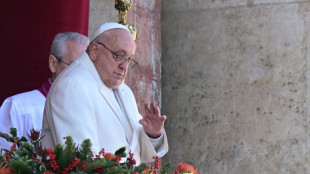

Basel votes to stump up bucks to host Eurovision
Basel voters on Sunday overwhelmingly approved the city putting up nearly $40 million towards hosting next year's Eurovision Song Contest, meaning the glitzy annual TV extravaganza will go ahead with its full customary pomp.
In Swiss referendums, most voters cast their ballots in advance by post, and after the polling stations closed at noon (1100 GMT), intermediate results showed 66.4 percent of voters in the northern city backed putting taxpayers' cash into staging Eurovision 2025.
Swiss singer Nemo won Eurovision 2024 with "The Code", giving Switzerland the right to host next year's event. Basel, on the border with France and Germany, was selected to stage the kitsch event.
But the small, ultra-conservative, Christian fundamentalist Federal Democratic Union of Switzerland party garnered enough signatures to secure a referendum on whether the 34.96 million Swiss francs ($39.5 million) approved by regional authorities for the show should be granted.
Swiss voters are used to having a direct say on how taxes are spent, and some bristled at the potential costs and hassle of the Eurovision circus.
Eurovision is a non-profit event, mostly financed by weighted contributions from participating public service broadcasters.
However, Eurovision says that "given the benefits that will flow" to host cities, they must also make a contribution.
Based on the last two contests in Liverpool and Malmo, Basel hopes to make about 60 million Swiss francs from the event, in particular in tourism and hospitality.
Had voters rejected granting the money, Eurovision 2025 would have been scaled right back to just the show itself, with no public events outside the main venue.
On the Rhine river, Basel is an international hub for the chemical and pharmaceutical industries, hosting the headquarters of Novartis and Roche.
But it also has its cultural side, with several internationally renowned museums, and the annual Art Basel event -- the world's top contemporary art fair.
Andrea Strahm, a lawyer and member of the Basel-Stadt regional assembly, told AFP: "We are a city of art, of fine arts, but also of music. It is always very important for our city."
Across Switzerland, voters were also deciding on whether to approve expanding the country's motorways at key congestion points, and on the powers given to landlords, with early results trends showing the votes were expected to be close.
- Motorways -
The government and the parliament want to ease bottlenecks on six motorway stretches, with the volume of traffic having doubled since 1990.
The plans include widening sections of the A1 motorway, constructing a tunnel under the Rhine in Basel, and new tunnels in St. Gallen and Schaffhausen.
The projects are estimated to cost 4.9 billion Swiss francs ($5.5 billion).
"These are billions that we will not be able to invest in other solutions, other means of transport which are more ecological and more efficient," said Angela Zimmermann, campaign manager at the actif-trafic association.
"These motorway expansion projects will increase traffic both on the motorway and in cities, worsen the funnel effect, and increase traffic jams," she told AFP.
- Tenancy laws -
The Swiss will also vote on two separate proposals aimed at giving landlords more flexibility, one on terminating leases and the other on limiting sub-letting.
Nearly 60 percent of people in Switzerland are tenants.
The new rules issued by parliament aim to prevent abuses in sub-letting, which are common in Switzerland.
Asloca, a major tenants' association, called the moves "direct attacks on the meagre tenant protection mechanisms" already in place.
Asloca "firmly opposes this attack by the real estate lobby, aimed at chasing tenants away in order to re-let at a higher price.
"By facilitating lease terminations, rents will explode, because with each change of tenants, the landlord can increase the rent," it argued.
W.Stewart--MC-UK




